The talent behind the test
Four National Merit Semifinalists discuss the test, talents, and future plans
Out of the 16,000 students who became a national merit semifinalist this year, 12 students came from Hebron. This Q&A focuses on four of these students, exploring who they are behind the scores.
Brendan Glascock
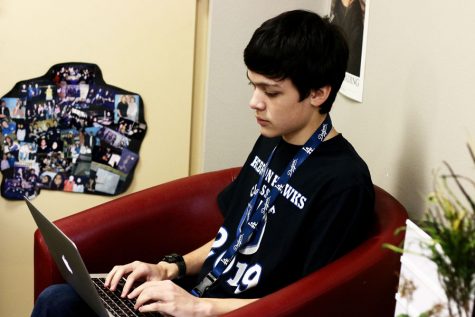
Question: How does it feel to be a national merit semifinalist? Did you expect to become one?
Answer: “It’s exciting for all the opportunities and scholarships that are out there for finalists. It felt a little bit daunting to me. The forms and the procedures are going to be a little confusing, but I’m still working on that. In my sophomore year, when I took the PSAT, I was really close to the cutoff. After a lot practice, I took a PSAT class my junior year. I was scoring comfortably in the zone in most of the practice tests, so I knew I had a pretty good shot. At the end of the day, it does come down to luck – you have so little room for error, you [cannot] make careless mistakes.”
Q: How did you prepare?
A: “Most of what I did was taking practice tests, both on my own and what my teachers assigned me. When you’re looking to compete for the National Merit spot, it’s not as much about learning material or content as it is just finding good strategies and getting your pacing right and forming good habits to avoid mistakes.”
Q: What would be the one thing you attribute the most to your success?
A: “I think the most important thing for me was my parents and how I was raised. They weren’t overbearing, and they never made me do extra studying or extra prep, but what they did to me a lot, especially when I was a little kid, was just having so many conversations [that] really helped me get a sense of the English language and its rules and nuances. As I got older, we would talk about math or science or things I’ve read that interested me. So in turn, I can look at articles and graphs and facts- anything on the SAT – and really be genuinely interested in it and be able to comprehend it quickly and answer questions about it.”
Q: What are your future aspirations?
A: “In the future, I’d like to get into a good four-year school, get a good internship and get a good job. A lot of people might be disaffected in with that view of the American dream, but I appreciate its stability. I’d like to go into an abstract or applied math field like computational data or actuarial science. It’s definitely a lot less popular among undergrad but they are in demand because of their relative obscurity.”
Q: What club/out of school activities are you involved in?
A: “My biggest extracurricular is Academic Decathlon. In addition to just studying and competing, it has given me a lot of unique opportunities. I’ve had a captain position for the past two years. I’ve done a lot of volunteering through it by maintaining and updating a wiki for all the scores. It’s also an opportunity to do paid work. I currently write study materials like flashcards, tests, quizzes, study guides for a third party company that makes curriculum for students to study and prepare for competition. Other than that, I’m involved in National Honor Society and badminton.”
Q: What do you think has been your biggest challenge throughout your school life?
A: “My biggest challenge has been learning to accept change head on, without worrying about things I have no control over. I would worry about things like my parents getting divorced or having to change schools right before high school started or just a class that I thought would be difficult, and I would have all these preconceived notions of how miserable the change would make me, but then a few months later I would realize that spending time with my parents separately is not necessarily a bad thing. Hebron is a very welcoming environment, and WHAP (World History AP) and APUSH (AP U.S. History) aren’t the end of the world.”
Cloey Crouch
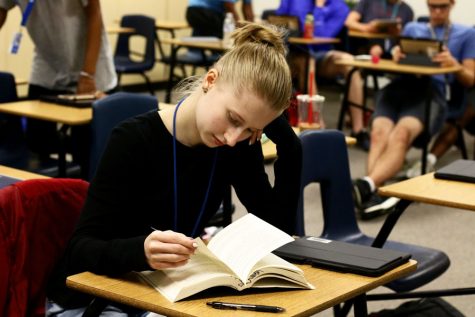
Q: How does it feel to be a national merit? Did you expect to become one?
A: “[I expected to get the national merit.] I was a couple points above the cutoff; I was high enough that I knew [based off of past cutoff scores] that I was going to get in.”
Q: How did you prepare? What would be the one thing you attribute the most to your success?
A: “When I was little, I read a lot. My childhood was filled with going to the library and checking out dozens and dozens of books, and I feel like that made my reading score super high. [I got] almost perfect whenever I took the PSAT practice tests or the real thing. My English scores were always a lot higher than my math scores and I only miss one or two or zero [questions].”
Q: What are your future aspirations?
A: “[I want to pursue] biomedical engineering.”
Q: What club/out of school activities are you involved in?
A: “Right now, I work a lot [at Studio Movie Grill]. Besides working, I am also in the science demo team and Key Club, so I do a bunch of volunteering on the weekends. I shelve at the Carrollton Public Library. I’m a youth service assistant and a shelving assistant, so I work with children and do storytime, and I also shelve the children’s section on Sundays.”
Q: What would be the one thing you attribute the most to your success?
A: “What was difficult in high school overall was just putting in the work. Once you put in the work and once you commit yourself to doing something, that thing becomes much easier. I feel like I’m good at recognizing where I’m going to need to put in a lot of work, and I’m really good at getting that done. I feel like that eases the difficulty of high school a lot.”
Q: What colleges are you applying to?
A: “Georgia Tech, Rice and UT.”
Justin Park
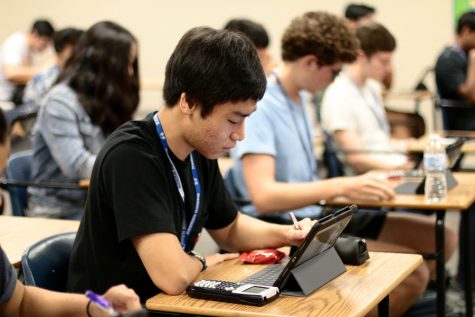
Q: How does it feel to be a national merit? Did you expect to become one?
A: “It feels great because I feel like all the hard work I put in paid off. I didn’t really expect it, because you never know what you’re going to get, but I worked hard. All I knew was that I did my best, so that’s all that mattered.”
Q: How did you prepare?
A: “I prepared by doing SAT [practices] over the summer and that translated into the PSAT. I also feel that in school, the subjects you take help you a lot as well.”
Q: What would be the one thing you attribute the most to your success?
A: “[The one thing that I attribute most to my success is] my hard work ethic as well as the support my parents gave me.”
Q: What are your future aspirations?
A: “I hope to go into the medical field as a physician, maybe in primary care.”
Q: What club/out of school activities are you involved in?
A: “I’m in NHS, SNHS (Science National Honor Society), Spanish NHS. I’m also in LINK [which is the] Liberty in Northern Korea [club]. I also play [the violin] in orchestra.”
Q: What would be the one thing you attribute the most to your success?
A: “I’d say it’s managing my time between classes. [High school] was big jump from middle school, and the classes were a lot harder.”
Q: What colleges are you applying to?
A: “I’m applying to Rice, UT Austin, and a couple of out of state colleges like Vanderbilt.”
Divya Viswanathan
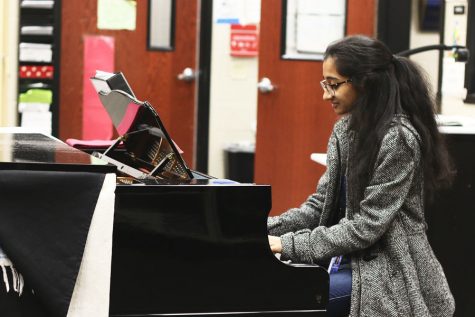
Q: How does it feel to be a national merit? Did you expect to become one?
A: “I did expect to become a national merit because I got my score and checked it with last year’s national merit scores, and [my score] was higher.”
Q: How did you prepare?
A: “I took one or two practice tests before the actual PSAT.”
Q: What would be the one thing you attribute the most to your success?
A: “My parents really encouraged me to get to this level because my brother did, so if I didn’t get it, it wouldn’t have been very good. If I didn’t get it, I wouldn’t be living up to my expectations. It’s something I have to deal with all the time just because of my brother, I constantly have to live up to those expectations. Personally, because it wasn’t too much of a big deal for me, I feel like that was one of the reasons I could do it. I have the external pressure, which helped me actually do it while [the lack of] internal pressure on myself [allowed me] to feel relaxed.”
Q: What are your future aspirations?
A: “I’m not totally decided yet, but I definitely want to develop my interests the way that the world is developing in terms of technology, but I’m not super into hardcore engineering fields. I want to be able to combine it with my humanities aspects. Something I’m really interested in is education and teaching to a certain extent. Being able to combine the physical form of teaching with the digital invasion is something I’m really interested in pursuing and seeing how to mold those two things together.”
Q: What club/out of school activities are you involved in?
A: “I’m in choir, Technology Student Association [and] NHS. I dance Bharatnatyam and play the piano.”
Q: What colleges are you applying to?
A: “I’m interested in Princeton because of the emphasis they have on their education there. UT is also good, but I’m trying to go out of state.”
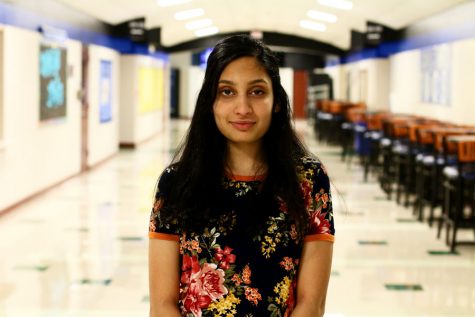
Senior Mrunmayi Sathaye is the feature editor and this is her second year on staff. She considers herself "artistically inclined-ish" and a pessimistic...


